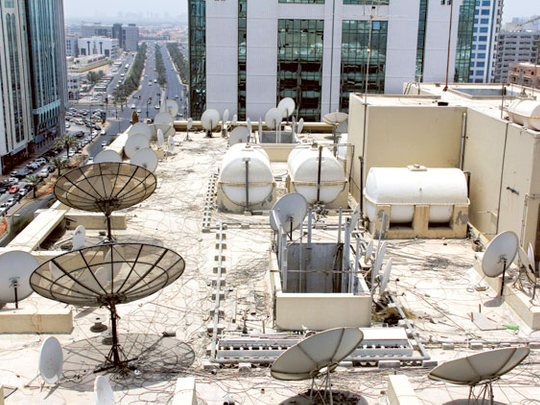
Abu Dhabi: Residents and building owners in the capital have been urged to remove satellite dishes from windows and balconies.
In a statement sent on Sunday by the Municipality of Abu Dhabi, the municipality also called for satellite dishes on the rooftop to be positioned neatly and away from the edges.
“Not only do haphazardly placed satellite dishes disfigure the general appearance of the buildings when installed at windows and balconies, but they can also fall down and seriously injure pedestrians passing below the building,” Khalifa Mohammad Al Rumaithi, director of public health at the municipality, told Gulf News.
Disorderly installation on rooftops also allows for the accumulation of dirt and breeding of insects between the cables, the municipal statement said. In addition, rescue operations in case of a fire or other emergency can also be hindered when these devices are placed at the window.
A campaign started last month has seen municipal inspectors visiting residents door to door, asking them to remove satellite dishes, Al Rumaithi said. The first phase of the campaign began in Tourist Club Area, where many buildings were found to have hundreds of privately installed satellite dishes.
“Warnings will be issued for residents who have satellite dishes at their windows and balconies, and for building owners who have these devices installed haphazardly on the rooftops. If they are still not removed within a month of the warning being given, the cases will be referred to the municipal court for the determination of fines,” he explained.
Although the municipal statement said that only four satellite dishes can be installed on the roof, Al Rumaithi said additional ones could be set up if they were requested by residents, and safely placed on the rooftop.
“If residents want a satellite network not available in the building, they should approach the building owner to set up a centralised system,” he added.
Executives at companies that set up satellite dishes also confirmed that installing the devices at windows is counter-productive.
Each satellite dish weighs at least five kilogrammes and poses a grave risk to pedestrians if they fall off, said Nirmal Kumar, sales manager at Vision Electronics, which sets up centralised networks in buildings.
“In addition, they are difficult to set up at windows, and the signal is not too good either. In fact, our company does not accept these requests for balconies and windows, especially as customers can require a lot of after-sales service because of the signal disruptions,” Kumar said.
Typically, older buildings are not provided with centralised networks, which is where the greatest number of dishes installed by individual residents can be spotted, he added.












